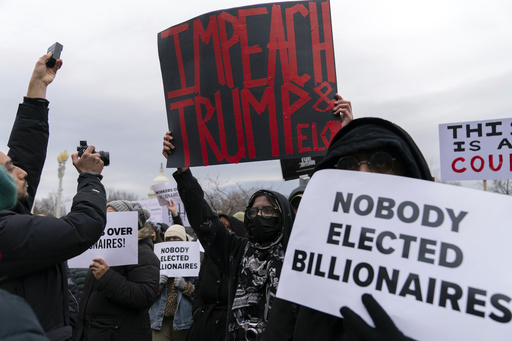
When Elon Musk acquired Twitter in 2022, his aggressive approach resulted in significant layoffs, halted rental payments, and the sale of office furnishings in an attempt to rejuvenate the platform. Now, Musk appears to be implementing a similar strategy within the federal government. Those familiar with Musk’s oversight of Twitter suggest that the same might be expected: major disruptions, ideology-driven cuts alongside financial motivations, a culture of intimidation, and a barrage of legal disputes.
Since taking the reins of the Department of Government Efficiency, Musk has effectively consolidated power with the endorsement of President Donald Trump, marginalizing seasoned bureaucrats, accessing sensitive information, and sparking a constitutional debate regarding the boundaries of presidential authority. Emily Horne, previously Twitter’s head of policy communications and now part of the Biden administration, articulates Musk’s method as a ruthless takeover that involves eliminating anyone perceived as a threat and destabilizing operations to align them with his ideology.
It remains uncertain whether Musk’s radical changes at Twitter, now known as X, have been effective. The company’s revenue has significantly decreased, its user base is diminishing, and even Musk has voiced his exasperation over the slow pace of financial recovery. Ross Gerber, a minority investor in X, has written down his investment to nothing and suggests that Musk’s endeavors in Washington will meet a similar fate. “The federal government is going to consume him and spit him out,” Gerber commented.
Despite some indications of success, such as millions of active users attracted to the platform, determining its financial health is complicated as the company is private. Concurrently, as Musk’s teams at the DOGE face the potential of massive federal layoffs, lenders who backed his Twitter acquisition are preparing for losses and attempting to offload their financial risks. Reversing any setbacks in drawing back vital advertisers to the platform seems challenging, and Musk has even initiated legal action against some companies that distanced themselves from X.
Examples exist of business leaders successfully transitioning to governmental roles focused on fiscal prudence, but Musk’s agenda appears to extend into ideological territory, seeking to dismantle what he perceives as a “woke” influence in government. Even before diversity, equity, and inclusion efforts turned into a key theme of Trump’s campaign, Musk had already cut Twitter’s DEI programs and those overseeing them.
Former Twitter employee Theodora Skeadas remarked, “The culture of Twitter is gone,” cautioning that the same could soon happen to various federal agencies with Musk’s influence. Musk also seems to be bringing a “loyalty performance” method to governmental operations, which, according to former executive Rumman Chowdhury, reflects his expectation for employees to demonstrate their worth in a manner that showcases allegiance.
Chowdhury points out that this approach fosters a culture of fear and intimidation, questioning its sustainability in leadership. Just as Musk’s previous maneuvers backfired during his time at Twitter—in which advertising revenue plummeted after he frightened brands away—his litigation efforts against advertisers are problematic. Following his initial threats to publicly shame brands, he has since escalated to lawsuits accusing departing companies of an “illegal boycott.”
In August, Musk’s lawsuits included reputable brands like Unilever and Mars, with his claims abruptly growing to encompass Lego, Shell International, and others just recently. The ongoing legal confrontations with over 2,000 former Twitter employees hint at the type of legal conflicts he could face in government roles. For instance, a federal judge recently paused a requirement for federal workers to accept Musk’s deferred resignation offer, which echoed an earlier warning he sent to Twitter employees.
Concerns regarding Musk’s governance style are noteworthy, as lawyer Shannon Liss-Riordan emphasizes that the costs and time involved in defending the lawsuits could have been mitigated by simply settling payments owed. She expressed worry over the implications for federal financial management if similar tactics were employed in government.
With Musk’s history of cost-cutting—including neglecting to pay bills leading to lawsuits by landlords—there is skepticism over the effectiveness of employing radical corporate strategies within public service. According to Nicholas Bagley, a law professor, Musk and Trump may be overstepping constitutional limits on spending, foreshadowing legal challenges that could hamper their aspirations.
Some, including tech investor Paul Graham, have advised Musk to proceed with caution, reminding him of the complexities and stability inherent in government compared to corporate entities. Gerber, who is skeptical about Musk’s government approach, predicts significant conflict ahead. “The notion that you can dismiss so many workers won’t pan out,” he cautioned. “An epic showdown is on the horizon.”

